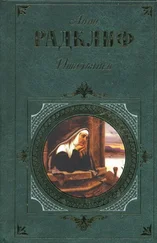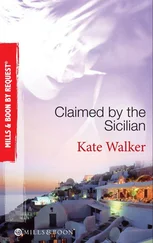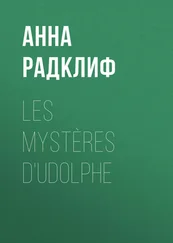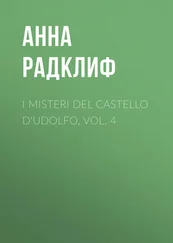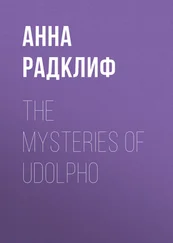Анна Радклиф - A Sicilian Romance
Здесь есть возможность читать онлайн «Анна Радклиф - A Sicilian Romance» — ознакомительный отрывок электронной книги совершенно бесплатно, а после прочтения отрывка купить полную версию. В некоторых случаях можно слушать аудио, скачать через торрент в формате fb2 и присутствует краткое содержание. Жанр: literature_19, Ужасы и Мистика, foreign_fantasy, на английском языке. Описание произведения, (предисловие) а так же отзывы посетителей доступны на портале библиотеки ЛибКат.
- Название:A Sicilian Romance
- Автор:
- Жанр:
- Год:неизвестен
- ISBN:нет данных
- Рейтинг книги:3 / 5. Голосов: 1
-
Избранное:Добавить в избранное
- Отзывы:
-
Ваша оценка:
- 60
- 1
- 2
- 3
- 4
- 5
A Sicilian Romance: краткое содержание, описание и аннотация
Предлагаем к чтению аннотацию, описание, краткое содержание или предисловие (зависит от того, что написал сам автор книги «A Sicilian Romance»). Если вы не нашли необходимую информацию о книге — напишите в комментариях, мы постараемся отыскать её.
A Sicilian Romance — читать онлайн ознакомительный отрывок
Ниже представлен текст книги, разбитый по страницам. Система сохранения места последней прочитанной страницы, позволяет с удобством читать онлайн бесплатно книгу «A Sicilian Romance», без необходимости каждый раз заново искать на чём Вы остановились. Поставьте закладку, и сможете в любой момент перейти на страницу, на которой закончили чтение.
Интервал:
Закладка:
From this state of entranced delight, she was awakened by the sound of music immediately under her window. It was a lute touched by a masterly hand. After a wild and melancholy symphony, a voice of more than magic expression swelled into an air so pathetic and tender, that it seemed to breathe the very soul of love. The chords of the lute were struck in low and sweet accompaniment. Julia listened, and distinguished the following words;
Still is the night-breeze!—not a lonely sound
Steals through the silence of this dreary hour;
O'er these high battlements Sleep reigns profound,
And sheds on all, his sweet oblivious power.
On all but me—I vainly ask his dews
To steep in short forgetfulness my cares.
Th' affrighted god still flies when Love pursues,
Still—still denies the wretched lover's prayers.
An interval of silence followed, and the air was repeated; after which the music was heard no more. If before Julia believed that she was loved by Hippolitus, she was now confirmed in the sweet reality. But sleep at length fell upon her senses, and the airy forms of ideal bliss no longer fleeted before her imagination. Morning came, and she arose light and refreshed. How different were her present sensations from those of the preceding day. Her anxiety had now evaporated in joy, and she experienced that airy dance of spirits which accumulates delight from every object; and with a power like the touch of enchantment, can transform a gloomy desert into a smiling Eden. She flew to the breakfast-room, scarcely conscious of motion; but, as she entered it, a soft confusion overcame her; she blushed, and almost feared to meet the eyes of Vereza. She was presently relieved, however, for the Count was not there. The company assembled—Julia watched the entrance of every person with painful anxiety, but he for whom she looked did not appear. Surprised and uneasy, she fixed her eyes on the door, and whenever it opened, her heart beat with an expectation which was as often checked by disappointment. In spite of all her efforts, her vivacity sunk into languor, and she then perceived that love may produce other sensations than those of delight. She found it possible to be unhappy, though loved by Hippolitus; and acknowledged with a sigh of regret, which was yet new to her, how tremblingly her peace depended upon him. He neither appeared nor was mentioned at breakfast; but though delicacy prevented her enquiring after him, conversation soon became irksome to her, and she retired to the apartment of Madame de Menon. There she employed herself in painting, and endeavoured to beguile the time till the hour of dinner, when she hoped to see Hippolitus. Madame was, as usual, friendly and cheerful, but she perceived a reserve in the conduct of Julia, and penetrated without difficulty into its cause. She was, however, ignorant of the object of her pupil's admiration. The hour so eagerly desired by Julia at length arrived, and with a palpitating heart she entered the hall. The Count was not there, and in the course of conversation, she learned that he had that morning sailed for Naples. The scene which so lately appeared enchanting to her eyes, now changed its hue; and in the midst of society, and surrounded by gaiety, she was solitary and dejected. She accused herself of having suffered her wishes to mislead her judgment; and the present conduct of Hippolitus convinced her, that she had mistaken admiration for a sentiment more tender. She believed, too, that the musician who had addressed her in his sonnet, was not the Count; and thus at once was dissolved all the ideal fabric of her happiness. How short a period often reverses the character of our sentiments, rendering that which yesterday we despised, to-day desirable. The tranquil state which she had so lately delighted to quit, she now reflected upon with regret. She had, however, the consolation of believing that her sentiments towards the Count were unknown, and the sweet consciousness that her conduct had been governed by a nice sense of propriety.
The public rejoicings at the castle closed with the week; but the gay spirit of the marchioness forbade a return to tranquillity; and she substituted diversions more private, but in splendour scarcely inferior to the preceding ones. She had observed the behaviour of Hippolitus on the night of the concert with chagrin, and his departure with sorrow; yet, disdaining to perpetuate misfortune by reflection, she sought to lose the sense of disappointment in the hurry of dissipation. But her efforts to erase him from her remembrance were ineffectual. Unaccustomed to oppose the bent of her inclinations, they now maintained unbounded sway; and she found too late, that in order to have a due command of our passions, it is necessary to subject them to early obedience. Passion, in its undue influence, produces weakness as well as injustice. The pain which now recoiled upon her heart from disappointment, she had not strength of mind to endure, and she sought relief from its pressure in afflicting the innocent. Julia, whose beauty she imagined had captivated the count, and confirmed him in indifference towards herself, she incessantly tormented by the exercise of those various and splenetic little arts which elude the eye of the common observer, and are only to be known by those who have felt them. Arts, which individually are inconsiderable, but in the aggregate amount to a cruel and decisive effect.
From Julia's mind the idea of happiness was now faded. Pleasure had withdrawn her beam from the prospect, and the objects no longer illumined by her ray, became dark and colourless. As often as her situation would permit, she withdrew from society, and sought the freedom of solitude, where she could indulge in melancholy thoughts, and give a loose to that despair which is so apt to follow the disappointment of our first hopes.
Week after week elapsed, yet no mention was made of returning to Naples. The marquis at length declared it his intention to spend the remainder of the summer in the castle. To this determination the marchioness submitted with decent resignation, for she was here surrounded by a croud of flatterers, and her invention supplied her with continual diversions: that gaiety which rendered Naples so dear to her, glittered in the woods of Mazzini, and resounded through the castle.
The apartments of Madame de Menon were spacious and noble. The windows opened upon the sea, and commanded a view of the straits of Messina, bounded on one side by the beautiful shores of the isle of Sicily, and on the other by the high mountains of Calabria. The straits, filled with vessels whose gay streamers glittered to the sun-beam, presented to the eye an ever-moving scene. The principal room opened upon a gallery that overhung the grand terrace of the castle, and it commanded a prospect which for beauty and extent has seldom been equalled. These were formerly considered the chief apartments of the castle; and when the Marquis quitted them for Naples, were allotted for the residence of Madame de Menon, and her young charge. The marchioness, struck with the prospect which the windows afforded, and with the pleasantness of the gallery, determined to restore the rooms to their former splendour. She signified this intention to madame, for whom other apartments were provided. The chambers of Emilia and Julia forming part of the suite, they were also claimed by the marchioness, who left Julia only her favorite closet. The rooms to which they removed were spacious, but gloomy; they had been for some years uninhabited; and though preparations had been made for the reception of their new inhabitants, an air of desolation reigned within them that inspired melancholy sensations. Julia observed that her chamber, which opened beyond madame's, formed a part of the southern building, with which, however, there appeared no means of communication. The late mysterious circumstances relating to this part of the fabric, now arose to her imagination, and conjured up a terror which reason could not subdue. She told her emotions to madame, who, with more prudence than sincerity, laughed at her fears. The behaviour of the marquis, the dying words of Vincent, together with the preceding circumstances of alarm, had sunk deep in the mind of madame, but she saw the necessity of confining to her own breast doubts which time only could resolve.
Читать дальшеИнтервал:
Закладка:
Похожие книги на «A Sicilian Romance»
Представляем Вашему вниманию похожие книги на «A Sicilian Romance» списком для выбора. Мы отобрали схожую по названию и смыслу литературу в надежде предоставить читателям больше вариантов отыскать новые, интересные, ещё непрочитанные произведения.
Обсуждение, отзывы о книге «A Sicilian Romance» и просто собственные мнения читателей. Оставьте ваши комментарии, напишите, что Вы думаете о произведении, его смысле или главных героях. Укажите что конкретно понравилось, а что нет, и почему Вы так считаете.

